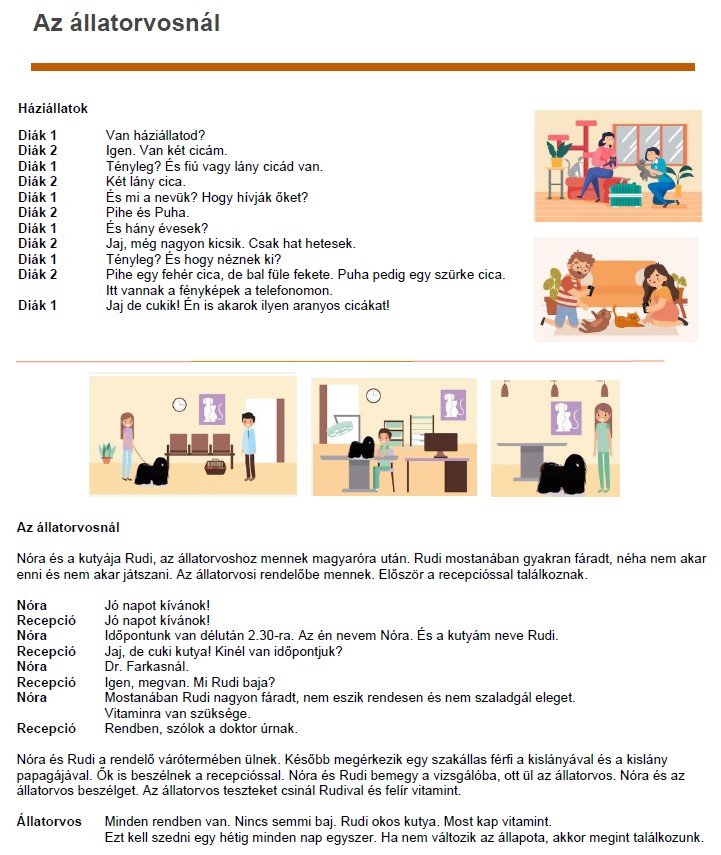Chapter 7 – Part 2 – Az állatorvosnál

Pronunciation warm up – Consonants
C and CS
Vocabulary – Practice the pronunciation of the following words
Random words – 2
Keep in mind: stress is always placed on the first syllable of a word.
Reading text

Note: noun+accusative -t, possessive personal pronouns (singular -m, -d, ja/je), conjugation (present definite), helping verbs +ni, time expression, expressions for frequency
Listening
audio/video – TBA
Dictation
Állatorvosnál
Reading – Read the text and learn the new vocabulary
Háziállatok Diák 1 Van háziállatod? Diák 2 Igen. Van két cicám. Diák 1 Tényleg? És fiú vagy lány cicád van? Diák 2 Két lány cica. Diák 1 És mi a nevük? Hogy hívják őket? Diák 2 Pihe és Puha. Diák 1 És hány évesek? Diák 2 Jaj, még nagyon kicsik. Csak hat hetesek. Diák 1 Tényleg? És hogy néznek ki? Diák 2 Pihe egy fehér cica, de a bal füle fekete. Puha pedig egy szürke cica. Itt vannak a fényképek a telefonomon. Diák 1 Jaj de cukik! Én is akarok ilyen aranyos cicákat!
Az állatorvosnál Nóra és a kutyája Rudi, az állatorvoshoz mennek magyaróra után. Rudi mostanában gyakran fáradt, néha nem akar enni és nem akar játszani. Az állatorvosi rendelőbe mennek. Először a recepcióssal találkoznak. Nóra Jó napot kívánok! Recepciós Jó napot kívánok! Nóra Időpontunk van délután 2.30-ra. Az én nevem Nóra. És a kutyám neve Rudi. Recepció Jaj, de cuki kutya! Kinél van időpontjuk? Nóra Dr. Farkashnál. Recepció Igen, megvan. Mi Rudi baja? Nóra Mostanában Rudi nagyon fáradt, nem eszik rendesen és nem szaladgál eleget. Vitaminra van szüksége. Recepció Rendben, szólok a doktor úrnak. Nóra és Rudi a rendelő várótermében ülnek. Később megérkezik egy szakállas férfi a kislányával és a kislány papagájával. Ők is beszélnek a recepcióssal. Nóra és Rudi bemegy a vizsgálóba, ott ül az állatorvos. Nóra és az állatorvos beszélget. Az állatorvos teszteket csinál Rudival és felír vitamint. Állatorvos Minden rendben van. Nincs semmi baj. Rudi okos kutya. Most kap vitamint. Ezt kell szedni egy hétig. Ha nem változik az állapota,akkor megint találkozunk.
Practice Exercises
1. Create sentences.
2. Add the correct noun ending/suffix.
3. Crossword for nouns with possessive personal endings.
4. Which one is correct?
Grammar Bites
1. COMPARISON OF ADJECTIVES
Comparison in the positive is expressed by the conjunction “mint” [as].
In the main clause, different demonstrative adjectives are used according to whether quality, quantity, size, or height are the factors of comparison.
| Milyen? (What kind of?) | olyan (ilyen) …, mint | as … as |
| Mennyi? (How much?) | annyi (ennyi) …, mint | so (or as) many, much … as |
| Mekkora? (How big?) | akkora (ekkora) …, mint | so (or as) big … as |
2. FORMATION AND USE OF THE COMPARATIVE “-BB”
The comparative is formed by adding the suffix -bb to bases ending with a vowel.
| fiatal | okos | olcsó | drága |
| fiatalabb | okosabb | olcsóbb | drágább |
3. EXPRESSIONS WITH COMPARATIVE
Comparison in the comparative is made either by the conjunction “mint” or by a special Hungarian construction, the -nál, nél suffix is added to the word of comparison.
| A banán édesebb, mint a citrom. | Bananas are sweeter than lemons. |
| A banán édesebb a citromnál. | Bananas are sweeter than lemons. |
4. SUPERLATIVE “LEG … BB”
A superlative is formed by the prefix “leg-“ added to the comparative. The superlative used as an attribute is preceded, usually by the definite article. The English phrase “one of the most expensive” can be translated into Hungarian as: (az) egyik legdrábább
| fiatal | okos | olcsó | drága |
| legfiatalabb | legokosabb | legolcsóbb | legdrágább |
Did you know? – Culture Corner
Famous Hungarian inventors and their inventions
pets (lit: domesticated animals)
my kitty
really?
your kitty
what are their names?
what is their name? (lit: how do they call them?)
how old are they?
oh
(they) are six weeks old
how they do look (like)?
white
left
(his/her) ear
black
grey
photos
(they) are cute
I want
such
cute
at (the) vet
to (the) vet
after (the) Hungarian class
sometimes
to eat
to play
to the office
at first
with (the) receptionist
(our) appointment
afternoon
my name (is)
my dog's name
at who?
your appointment
got it
his/her problem
recently
properly
doesn't run
enough
(s)he needs
all right, ok
I speak/I am talking
to (the) doctor
waiting room of (the vet's) office
(they are) sitting
later
bearded man
with her/his daughter
with his/her parrot
they talk
(she/he) goes in
to (the) exam room
(s)he is doing tests
(s)he precribes
everything
nothing is wrong
smart
dog
(s)he gets, receives
this must be taken
for (a) week
(s)he changes
his/her condition
again
we meet
